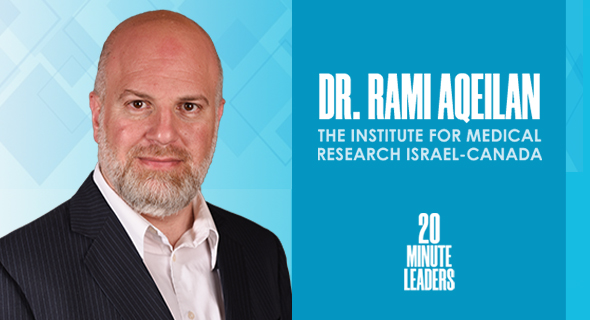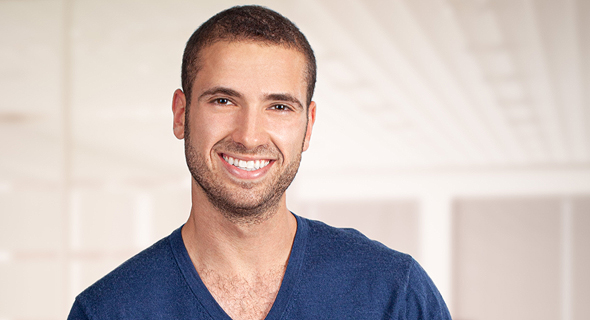20-Minute Leaders
“Seeing the fruits of what you're doing is always a motivation to keep going ahead.”
Dr. Rami Aqeilan joins Michael Matias to discuss his desire to learn something new every day and explore the beauty of the world around him
Click Here For More 20MinuteLeaders
You're a professor of immunology and cancer research at The Hebrew University Hadassah Medical School. Tell me about your journey.
I was born in East Jerusalem. Actually, in Sheikh Jarrah. I did my bachelor’s at the University of Jordan. Then I joined The Hebrew University as a master and a PhD student working on cancer research.
In the 10th grade, I got to meet this teacher who made me love biology. I would wait for his lessons to hear and learn new things about the cells, how they function, all these organelles, all these reactions. I decided I want to learn more about life, about what's going on within these cells. Slowly, I got more and more interested in mechanisms of diseases.
Did you get excited by biology because of the teacher’s style or the material?
The teacher just made the material so exciting. I think he had this style that made me really love the material and pushed me to ask more questions and be more and more curious. So, it is a combination.
Walk me through your academic career.
I finished biology, and I was really not sure what I'm going to do with this. I never saw myself as a professor. I started working in one of the medical centers in the old city of Jerusalem. I hated it. I didn't like this type of work. This is where my father actually pushed me to go and find out about Hebrew U, where I first started my master. Then I moved directly to a PhD program looking at targeted therapy, how we can selectively eliminate cancer cells.
Then I had to go to a post doc. I chose to go to the USA. I joined the lab of Carlo Croce and moved with him to Ohio State University. There, I started my first faculty position. I stayed there for four years. We decided to go back home and I started my job at Hebrew U. I moved from a senior lecturer, to associate professor, to full professor. Today, I'm heading the Institute for Medical Research, Israel-Canada.
 Dr. Rami Aqeilan, chairman of the Institute for Medical Research, Israel-Canada. Photo: N/A
Dr. Rami Aqeilan, chairman of the Institute for Medical Research, Israel-Canada. Photo: N/A
Tell me about what you studied all these years. Dumb it down for me. What is it all about?
It's all about what goes wrong. So, a normal cell becomes crazy and cannot be controlled. This was what interests me: to know what are the very early steps that happen in a normal cell, changing it from behaving well to becoming just so uncontrolled in growth, in behavior, in signaling, in things that it's not supposed to do.
I was very curious to learn about this very initial step. What regions are affected first in our DNA in order to make this cell become cancerous? We changed some of the DNA of cells and tried to predict and to prove whether these changes that we think of could really get these cells to be uncontrollable. That was just one aspect. Then, of course, I like to build models. The models that we do usually in the lab are either animal models—mouse models, for example—or we use other non-animal models.
This is the research that you're doing today, right?
Our research very much looks into what we know in the medical field as a genome stability or instability that is seen mainly in cancer. But now there is also more interest in studying these changes in other diseases. We study these regions in the genome that are called "fragile regions,” which are more vulnerable to breaks, to changes, to mutations.
There are genes that we know of and these genes should have a function. We try to characterize these genes and to understand their function. We do this in cells but also in a whole organism and a whole animal to see if we change this gene that is found in this very specific fragile region in the genome, what would be the consequences on tumor formation? On brain homeostasis?
We recently started to work on childhood epilepsy because of genes that are very important to maintain the homeostasis of the central nervous system. It turned out that many of these genes that are critical for cancer also have other functions in other diseases, like epilepsy, Alzheimer's disease, or Parkinson's.
How do you measure progress? What, as the leader, do you do to keep the team focused? What is sort of the end goal of research like this?
I think what satisfies really a researcher is to have a better understanding of the mechanisms, of action, of whatever we study. But then I think the most satisfying, at least for me, is really to be able to translate this basic knowledge to benefit the patient. This is where I see that we are heading in our research. The knowledge that we have gathered and we have invested to understand, now we are in the phases of translating this to help patients.
We have now an indication that we are working on that we are hoping we can start clinical trials in patients and in children in order to relieve suffering and help them and their families. If this is going to work, I will be extremely satisfied. This would be really an excellent achievement for humanity, for science, and for a scientist.
On a personal level, how do you deal with the fact that it could turn out that the research doesn't work or give the finding that you hoped for?
Actually, the normal situation is that things don't work somehow. So, we kind of get used to this. But of course, we never give up because we need to be persistent. This is something about me and every successful person: you need to be persistent, you need to insist, you need to believe in what you're doing. Only by having these feelings can you really keep going and try again, troubleshoot, start over, and make it work.
What type of tools do you use with your team on a leadership level to help guide them?
We have an excellent relationship with the team members. It's about brainstorming together, mentoring at the different stages of their studies and eventually career. Interaction, talking, brainstorming, and mentoring—I think these are all the kind of stuff that we do in order to ensure that the students develop and get to become really next generation leaders.
How did the way that you experienced the world change from before you discovered the field of biology to after?
It was a journey to go through, to mature through this journey and to realize that this is really what I love. I love to better understand and to be able to make a change. I like doing small steps. I think this is exactly what I went through. Small steps with dedication, with persistence, and you got there. I think that the more that you believe in what you're doing, the more that you will get there and achieve and get to your goals.
Besides the potential impact on patients, what really inspires you about your work?
I'm inspired every day by learning something new. I'm a believer and I just love to explore the beauty of creation and the beauty of what is going on around us. This really keeps me going on to learn more, to discover more, to help. Seeing the fruits of what you're doing is always a motivation to keep going ahead.
What are a few words you would use to describe yourself?
I'm very persistent and spontaneous. I love my family.
 Michael Matias. Photo: Courtesy
Michael Matias. Photo: Courtesy Michael Matias, Forbes 30 Under 30, is the author of Age is Only an Int: Lessons I Learned as a Young Entrepreneur. He studies Artificial Intelligence at Stanford University, while working as a software engineer at Hippo Insurance and as a Senior Associate at J-Ventures. Matias previously served as an officer in the 8200 unit. 20MinuteLeaders is a tech entrepreneurship interview series featuring one-on-one interviews with fascinating founders, innovators and thought leaders sharing their journeys and experiences.
Contributing editors: Michael Matias, Megan Ryan



